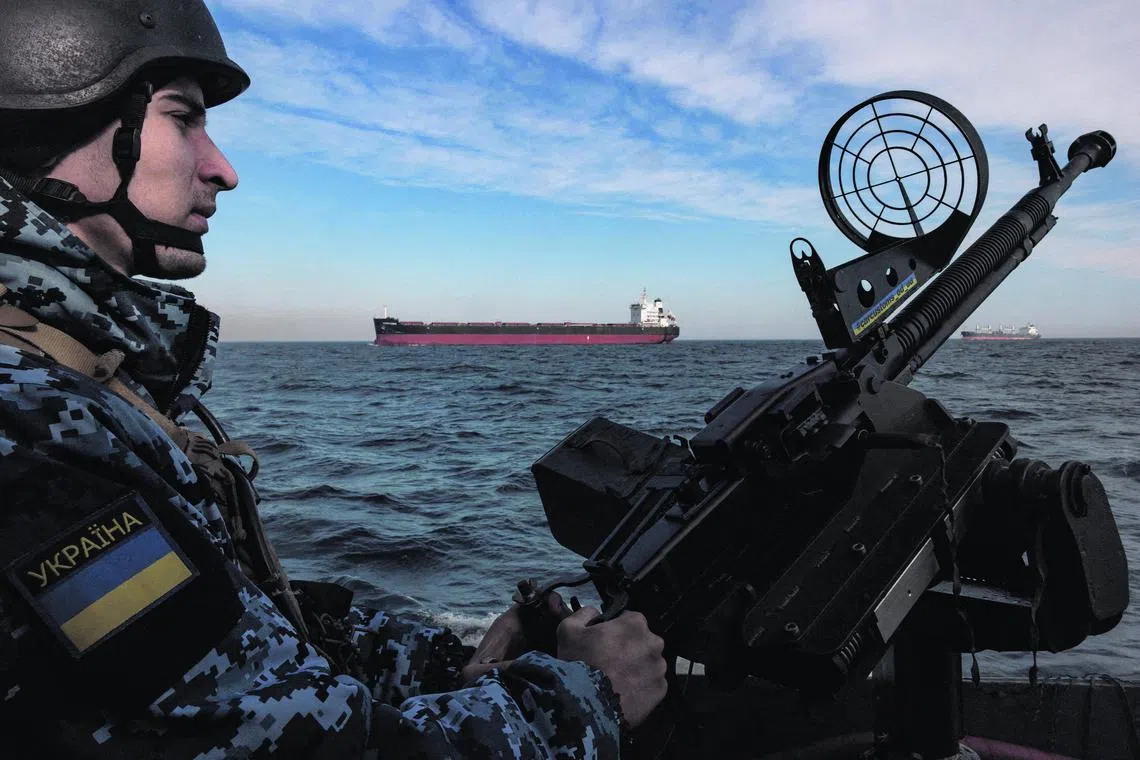US, Russia hold Black Sea ceasefire talks in Saudi Arabia after overnight strikes pound Ukraine
Sign up now: Get ST's newsletters delivered to your inbox

A serviceman of Ukraine's coast guard manning a gun on a patrol boat as a cargo ship passes by in the Black Sea on Feb 7, 2024.
PHOTO: REUTERS
Follow topic:
RIYADH – US and Russian officials held talks in Saudi Arabia on March 24 aimed at sealing a Black Sea maritime ceasefire deal before securing a wider agreement in Ukraine, as Moscow and Kyiv used drones to pound each other.
The talks, which followed US talks with Ukraine in Saudi Arabia on March 23, came after Russia launched its third consecutive overnight air attack on Kyiv, wounding one person and damaging houses in the region around the Ukrainian capital.
Russia, for its part, said it had downed 227 Ukrainian drones in the last 24 hours, as firefighters in its southern Krasnodar region battled for a fifth day to put out a blaze at an oil depot struck in a Ukrainian drone attack last week.
US President Donald Trump has intensified his drive to end the three-year-old conflict after he last week spoke to both Ukrainian President Volodymyr Zelensky and Russian President Vladimir Putin.
The White House says the aim of the talks is to reach a maritime ceasefire in the Black Sea, allowing the free flow of shipping, though the area has not been the location of intense military operations in recent months. It was not clear if the talks would swiftly result in a new agreement or if they were designed to give the sides cover to discuss a wider agenda.
“This is primarily about the safety of navigation,” Kremlin spokesman Dmitry Peskov said, noting that an earlier agreement on Black Sea shipping brokered in 2022 had failed to deliver what it had promised Moscow.
The focus on the Black Sea is a much narrower one than a broad 30-day ceasefire agreement that the US proposed in Saudi Arabia earlier in March, an indication that Russia may still be some way from agreeing to any significant pause in fighting.
Ukraine has inflicted significant damage on Russia’s Black Sea Fleet since 2022, forcing Moscow to move some vessels out of its base in Crimea.
Despite Russian attacks on its ports, Ukraine has been able to export grain, iron ore and other commodities via the Black Sea from its three main seaports in its Odesa region at levels similar to those before the war.
It has not been able to use the port of Mykolaiv, another one-time major export hub, however, and Mr Zelensky called on European Union leaders earlier in March to support the idea of a truce at sea and in the air.
Europe’s scepticism
A source briefed on the planning for the talks said the US side was being led by Mr Andrew Peek, a senior director at the White House National Security Council, and Mr Michael Anton, a senior State Department official.
Russia was represented by Mr Grigory Karasin, a former diplomat who is now chair of the Federation Council’s Foreign Affairs Committee, and Mr Sergei Beseda, an adviser to the director of the Federal Security Service, the main successor agency to the Soviet-era KGB.
Mr Karasin was cited by Interfax news agency as saying during a break after nearly three hours of talks that consultations were progressing “creatively” and that the two sides had discussed issues regarded as “irritants” in their bilateral ties.
Mr Trump, who has repeatedly called for an end to the war in Ukraine, has expressed broad satisfaction over the way talks have been going and has been complimentary about Mr Putin’s engagement in the process so far.
But there is deep scepticism among major European powers over whether Mr Putin is ready to make meaningful concessions, or will stick to what they see as his maximalist demands that do not appear to have changed since he sent tens of thousands of troops into Ukraine in 2022.
Mr Putin says he is ready to discuss peace, but that Ukraine must officially drop its Nato ambitions and withdraw its troops from the entirety of the territory of four Ukrainian regions claimed and mostly controlled by Russia.
Pause on energy attacks
The Kremlin said on March 24 that Russia was still abiding by a 30-day moratorium on attacking Ukrainian energy infrastructure targets that Mr Putin last week promised Mr Trump, despite Kyiv continuing to strike Russian energy facilities.
Ukraine, which said it would agree to the pause only if a formal document was signed, has accused Moscow of flouting its own moratorium, which Russia denies.
White House National Security Adviser Mike Waltz told CBS’ Face the Nation on March 23 that the US, Russian and Ukrainian delegations were assembled in the same facility in Riyadh.
Beyond a Black Sea ceasefire, he said, the teams will discuss “the line of control” between the two countries, which he described as “verification measures, peacekeeping, freezing the lines where they are”. He said “confidence-building measures” are being discussed, including the return of Ukrainian children taken by Russia.
Saudi state TV said on March 24 that Ukrainian Defence Minister Rustem Umerov had arrived in Saudi Arabia. His presence may indicate that the US delegation will hold further talks with Ukraine after its consultations with Russia conclude.
The Kremlin’s Mr Peskov said Moscow and Washington had a common understanding on the need to move towards a settlement to end the war, but said there were still many different aspects to be worked out. REUTERS

